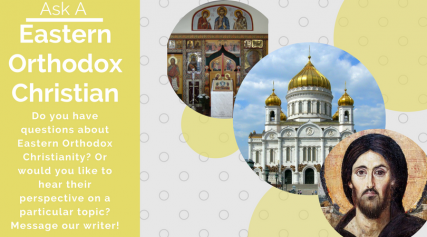What would you like to know about the Eastern Orthodox Christian faith? Submit your question.
By Nick Damascus
What is the Orthodox view on Heaven, Hell, and Purgatory?
Heaven and Hell
In the Eastern Orthodox Christian Church, there is no official doctrine or dogma concerning heaven and hell. They are defined from a consensus of theological opinions of the saints and church fathers. They are not so much a place, but rather a condition or attitude to the response of the love of God.
The Orthodox belief is that God is everywhere present and fills all things. There is no created place of divine absence. Since his presence is unavoidable, the Orthodox understanding of heaven and hell is the love of God (a consuming fire). This consuming fire is will either deify an individual or burn them (not physically) depending on the condition of one’s spiritual heart.
For those who love God, his presence will be radiant bliss and unspeakable delight and joy. For those who choose not to love God or are incapable of loving or loving God, this consuming fire (the love of God) is unspeakable anguish and torment for them. This reference is described in Matthew 25:30 as the, “weeping and gnashing of teeth.”
There are two other interim places, Paradise and Hades that appear to have some of the characteristics of heaven and hell respectively. They will probably only exist until the Final Judgment.
From the time of Adam and Eve until the resurrection of Christ, every living person that died went to a place called Hades or Sheol (not hell). Hades is referenced as the “… the spirits in prison” in 1 Peter 3:19 where even the saints resided who were later liberated after the resurrection of Christ to enter Paradise.
In Luke 23:43 Christ on the cross said to the thief on the cross, “Assuredly, I say to you, today you will be with me in paradise,” not heaven. The thief on the cross was the first one to enter paradise. Paradise could be similar to the Garden of Eden liken to a place of rest for the departed in Christ. In the final judgment, Christ returns to judge the living and the dead whose kingdom shall have no end, where only heaven and hell will exist.
Purgatory
In the first 1,000 years of Christianity, there was one, holy, and apostolic church, and there was no doctrine of Purgatory. Then after the great schism of 1054 AD of East and West, the teaching was officially established in the West by the Roman Catholic Church in the First Council of Lyons 1245 AD. In the Eastern Orthodox Church the ancient church of Christ and the Apostles, there never was or has been a doctrine of Purgatory.






